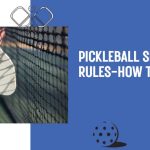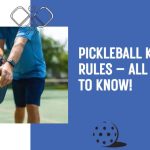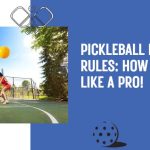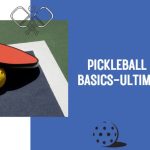Pickleball is a fun and exciting sport that combines tennis, badminton, and ping-pong. It can be played by people of all ages and skill levels, and it is growing in popularity worldwide. However, like any sport, pickleball has some etiquette and unwritten rules that players should follow to ensure a respectful and enjoyable game.

This article will share some of the most common pickleball etiquette you should know and practice. Whether you are a beginner, an expert, a casual, or a competitive player, these etiquettes and unwritten rules will help you play pickleball gracefully and in style.
Let’s find out what they are!
8 Pickleball Etiquettes
You won’t find these rules in any official pickleball tournament handbook or rulebook, but I think they’re the most important:
1. Avoid Lobs Behind Restricted Players
A restricted player has a physical limitation or injury that prevents them from moving quickly or reaching high. If you are playing against a restricted player, avoid lobbing the ball behind them, as this is considered rude and unfair. Instead, play the ball to their level and challenge them with your skills and strategy.
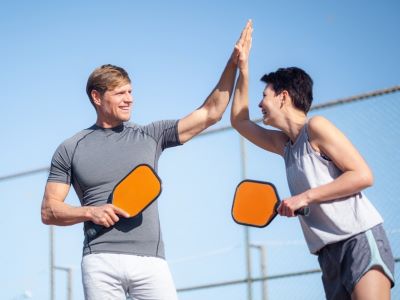
2. Call Out the Score Loudly Before You Serve
Before each serves, call out the score loudly and clearly so that everyone can hear it. Include the server’s score, the receiver’s score, and the server number (if playing doubles). For example, “two-four-two.” It helps avoid confusion and disputes over the score.
3. Meet at the Net
After each game, meet your opponents and partners at the net and shake hands or tap paddles. Thank them for the game and compliment them on their good shots. It shows appreciation and sportsmanship and creates a positive atmosphere on the court.
4. Wait Until Everyone Is Ready
Before serving or returning, wait until everyone is ready and in position. Do not rush or surprise your opponents or partners with a quick or unexpected serve or return. It shows respect and courtesy and allows everyone to play their best.

5. Congratulate Opponents for Good Shots
When your opponents make a good shot, such as a winner, an ace, or a save, congratulate them by saying, “Nice shot,” “Good serve,” “Great volley,” or something similar. It shows appreciation and sportsmanship and acknowledges their skill and effort.
6. Ball Management
When a ball from another court rolls into your court, stop the play and return the ball to the other court as soon as possible. Do not kick or throw the ball away or ignore it. When you need a ball from another court, ask politely for it or wait until the play ends. Do not interrupt or distract the other players.
7. Don’t Give Lessons on the Court
When playing pickleball, don’t give your opponents or partners unsolicited advice, tips, or feedback. Do not coach or criticize them for their mistakes or errors. Do not make negative comments or gestures about their performance. Instead, encourage and support them and respect their style and pace.
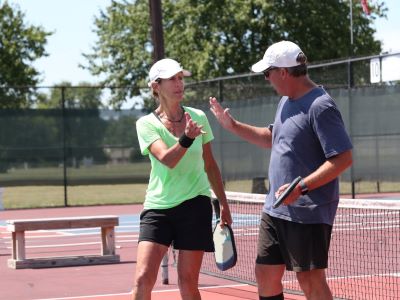
8. Watch the Outbursts
When playing pickleball, watch your outbursts and emotions. Do not yell, curse, slam your paddle, or throw a tantrum when you miss a shot or lose a point. Do not argue or complain about calls or rules. Do not celebrate excessively or mock your opponents when you win a point or a game. Instead, control your emotions and act with dignity and grace.
FAQs
Proper pickleball etiquette includes courteous and sportsmanlike behavior on the court. Players should always respect their opponents and show good sportsmanship. Players should also make sure to keep a safe distance from each other during play, be aware of others near the court, never argue with calls made by other players or officials, and always follow the official rules of pickleball.
To keep score in pickleball, each team will earn one point for every rally they win. The team that wins at least 11 points first (or is ahead by two points if the score is tied) will win.
A fault in pickleball is when a player needs to follow the game’s rules, such as hitting the ball out of bounds, doubly hitting, or volleying (hitting without allowing the ball to bounce). When a fault is committed, the opposing team scores a point, and the rally ends.
In pickleball, the ball can bounce as many times as needed until one of the players returns it to their opponent. However, legally in pickleball, the ball must bounce on the other side of the net before it can be returned. So, in theory, it could bounce infinitely; however, it is limited to a few bounces.
Wrap Up!
Pickleball is a fun and social sport enjoyed by everyone of all ages and skill levels. However, like any sport, pickleball has some etiquette and unwritten rules that players should follow to ensure a respectful and enjoyable game.
In this brief, we have shared some of the most common pickleball etiquette you should know and practice. These etiquette and unwritten rules will help you play pickleball with grace and style. They will also help you make new friends and improve your pickleball skills. This brief has helped you learn more about pickleball etiquette and unwritten rules.
Now play pickleball and have fun! Happy Pickleballing!

I am a professional physiotherapist and the author of the BallSportsPro. I worked with athletes of all levels, from amateur to professional, and i helped them overcome injuries and improve their performance. I am a certified Pickleball instructor and has been playing the sport for over 10 years.

